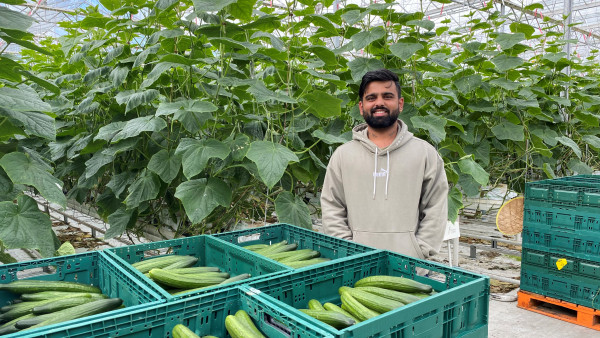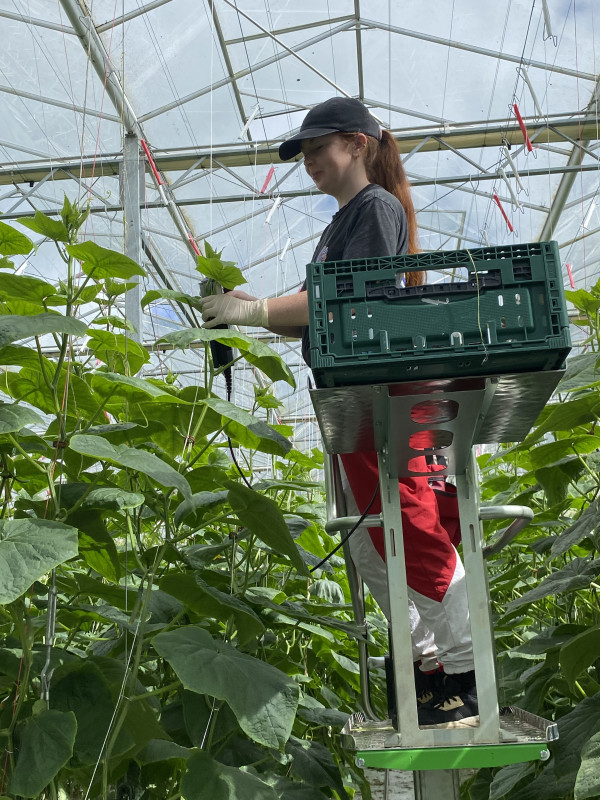Tech integral to telegraph success
1 February 2023
Bombay grower Ranjit Singh may be young, but his willingness to learn and embrace technology has now secured him a spot as one of the country’s biggest cucumber growers. HELENA O’NEILL chats with Ranjit about how important technology is to his business.

Cucumber grower, Ranjit Singh
A short drive from the Auckland Southern Motorway sits the pride and joy of Ranjit Singh’s cucumber business. Bmak Evergreen’s Bombay site includes a high-tech Apex greenhouse, utilising a range of innovative machinery.
Moving to New Zealand in 2014, Ranjit spent some time working in a kiwifruit orchard before taking up work in greenhouses. He then began growing cucumbers in a 1500sq m greenhouse that he leased in 2016. Now he owns his own property with 4000sq m of greenhouses and leases a further three other sites in South Auckland and North Waikato, including the greenhouse at Bombay.
“My parents had experience working with capsicums, but I wanted to grow cucumbers. They are a four-month crop, if anything happens like losing some plants, I can change within four months. Capsicums, eggplants, or tomatoes have a one-year growing cycle – we can’t replace them within four months.”
Ranjit solely grows telegraph cucumbers but plans to soon branch out into Lebanese cucumbers. Each week over 100,000 cucumbers are picked at Bmak Evergreen’s greenhouses.
Reduced sunlight hours led to smaller crops this past year, and Ranjit is hoping for a more balanced year ahead.
“We have had a lot of rain, which has had a big impact on us. We have water, humidity, and a heater system but we don’t have enough light. It’s the most important for the growing part.
“We’re struggling with increased costs this year. Our gas, fertiliser and labour costs are so high.”
The business employs around 25 staff, up to 30 in the peak of the season. While securing enough staff over the past year hasn’t been an issue, Ranjit is aware that finding staff in the horticulture industry can be challenging.
To keep labour costs down while improving crops, Ranjit has sought to become more efficient and has invested in technology.
He says growers need to be savvy and embrace technology where they can in order to become more efficient, especially as labour and energy costs continue to climb.
“In this industry, we need to do smart work, not hard work. I believe in machinery. But we can't trust it 100 percent; I still need to set it and fix things when they go wrong. The machinery I’ve bought in the past year has really helped me. Our big challenge is spraying. We have a big area, and we would have one person spraying in the glasshouse with the chemicals. Instead, we can do it automatically with no one around the chemicals.”
Likewise last year Ranjit upgraded his automatic wrapping machine. Telegraph cucumbers need to be wrapped the same day as picking to ensure they remain fresh and firm, so efficient wrapping is a must.
“The old automatic machine could wrap 25 to 30 cucumbers per minute, but these do 55 to 60 per minute.”
The business also uses mechanised trolley lifts to speed things up and improve safety for staff as they harvest and clip the rows inside the greenhouses.

The mechanised trolley lifts have increased productivity
Ranjit has invested in Ftek automatic spraying machines which are important tools for controlling insects. These reduce the labour requirement and remove the need for himself or his staff to spray manually.
“If you have a good spray system then you can control everything. If people want to invest, invest in something like this. You fill up the tank, press the button, and away you go. No need for a mask, PPE (personal protective equipment), jacket, gumboots, nothing. It’s quick and the fertiliser is really perfect.
“I do my best to grow without chemicals, but sometimes there are no other options, especially for controlling thrips in this industry.”
Over the past 12 months thrips have been particularly bad, he says.
The greenhouses aren’t immune to fungal threats, with Ranjit always on the lookout for Fusarium and Pythium. He sterilises water and controls watering to reduce crop losses.
“If you have a good sprayer, using good fungicide and insecticide, then you are growing good produce.”
The new greenhouse at Bombay features energy screens which Ranjit says have made a significant reduction to the site’s energy consumption, estimated to be between 30 and 35 percent less than his older greenhouses.
Ranjit solely supplies T&G and says they help guide him, also referring him to other growers for advice and troubleshooting.
“They really do help me.”
Ranjit has been impressed with the support for his business from different parts of the industry – including suppliers, T&G, and other growers.
“I’m just a young guy, my suppliers know that the young fella wants to grow his business, so they help me. My [greenhouse crop] consultant John Thompson is a really good guy. He looks after my crops, fertilisers, and my sprayers. I’m always thinking about how I can fix something when faced with a problem.”
Hiring a greenhouse crop consultant like John has made a positive difference to his business, Ranjit says.
“Before I met John, my cucumber plants were growing maybe 15 cucumbers per plant. Now they are 25 to 30 cucumbers per plant.
“Knowledge is the most important. If you want to run any business, first of all you need knowledge. Look at the industry and get knowledgeable.”
Originally published in February 2023 issue of NZGrower magazine.
